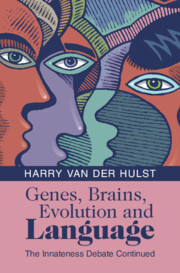Book contents
- Genes, Brains, Evolution and Language
- Genes, Brains, Evolution and Language
- Copyright page
- Contents
- Figures
- Preface
- Acknowledgments
- Part I Introduction
- Part II Third Factors and Formal Languages Theory
- Part III Brains and Genes
- Part IV Animal Communication
- Part V The Evolution of Mind and Language
- 10 The Evolution of Mind and Language: Basic Issues
- Part VI Winding Up
- Notes
- Further Reading
- Index
10 - The Evolution of Mind and Language: Basic Issues
from Part V - The Evolution of Mind and Language
Published online by Cambridge University Press: 13 November 2025
- Genes, Brains, Evolution and Language
- Genes, Brains, Evolution and Language
- Copyright page
- Contents
- Figures
- Preface
- Acknowledgments
- Part I Introduction
- Part II Third Factors and Formal Languages Theory
- Part III Brains and Genes
- Part IV Animal Communication
- Part V The Evolution of Mind and Language
- 10 The Evolution of Mind and Language: Basic Issues
- Part VI Winding Up
- Notes
- Further Reading
- Index
Summary
The question “where does language come from?” has fascinated people for as long as we know. While all sorts of answers have been proposed, ranging from an appeal to divine intervention to “by chance,” there is currently a trend to approach this difficult question using circumstantial evidence from many different disciplines. While no agreement is in sight, advances have been made, in part because scientists are now able to ask better, more specific questions due to the fact that linguists have made a lot of progress in their detailed understanding of language structure and the way in which languages can change over time.
Keywords
Information
- Type
- Chapter
- Information
- Genes, Brains, Evolution and LanguageThe Innateness Debate Continued, pp. 369 - 406Publisher: Cambridge University PressPrint publication year: 2025
Accessibility standard: WCAG 2.1 AA
Why this information is here
This section outlines the accessibility features of this content - including support for screen readers, full keyboard navigation and high-contrast display options. This may not be relevant for you.Accessibility Information
Content Navigation
Allows you to navigate directly to chapters, sections, or non‐text items through a linked table of contents, reducing the need for extensive scrolling.
Provides an interactive index, letting you go straight to where a term or subject appears in the text without manual searching.
Reading Order & Textual Equivalents
You will encounter all content (including footnotes, captions, etc.) in a clear, sequential flow, making it easier to follow with assistive tools like screen readers.
You get concise descriptions (for images, charts, or media clips), ensuring you do not miss crucial information when visual or audio elements are not accessible.
Visual Accessibility
You will still understand key ideas or prompts without relying solely on colour, which is especially helpful if you have colour vision deficiencies.
Structural and Technical Features
You gain clarity from ARIA (Accessible Rich Internet Applications) roles and attributes, as they help assistive technologies interpret how each part of the content functions.
